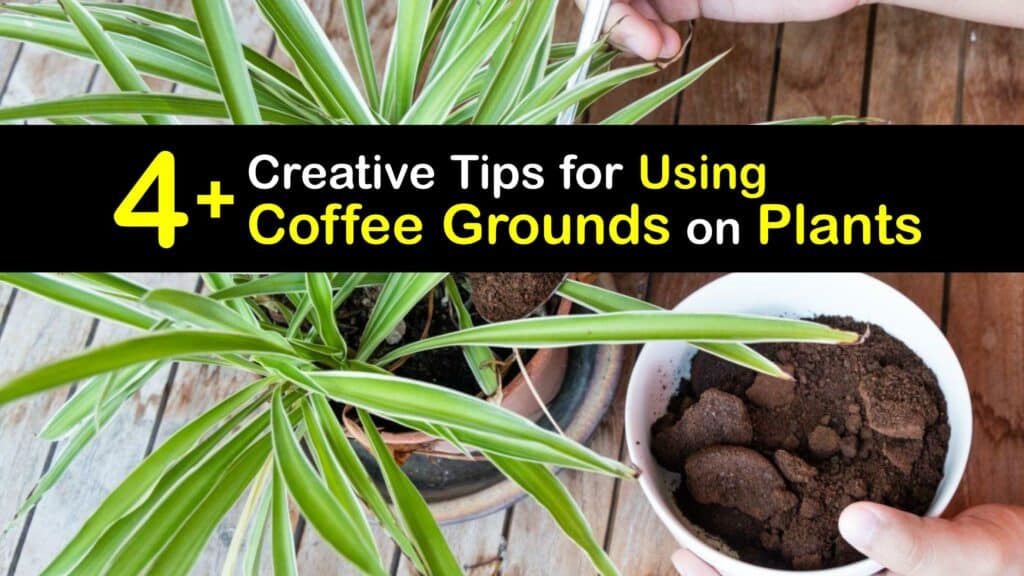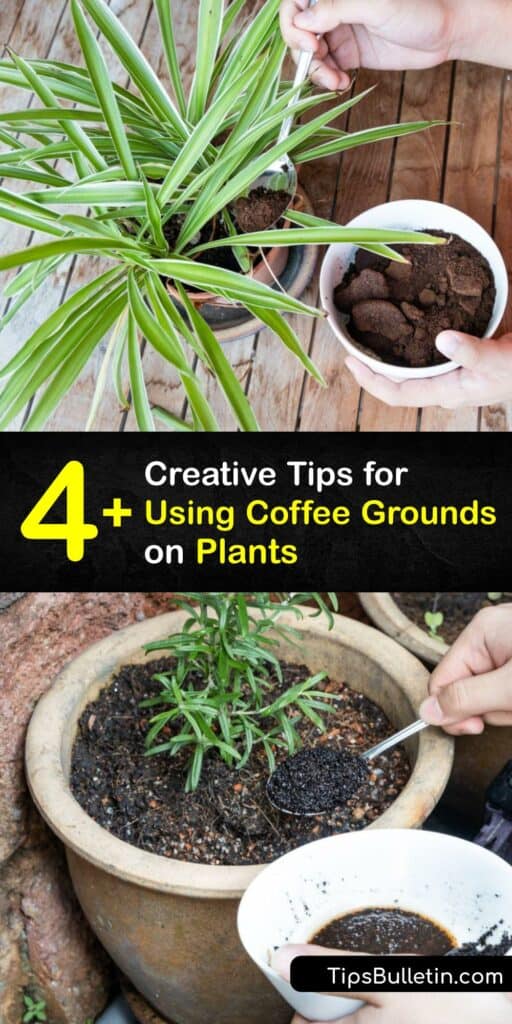Those interested in organic and chemical-free gardening quickly discover how to use coffee grounds for plants. Coffee grounds are one of the by-products of the coffee bean and are discarded worldwide as trash, yet they are valuable to any gardener. Are coffee grounds good for plants? Coffee grounds are fantastic for plants as they’re packed with the nutrients plant life needs to grow and thrive.
Thanks to their unique structure, coffee grounds make a simple natural mulch to help the soil retain water while improving its structure. They also make an excellent composting material if you don’t have the time or reason to use your morning coffee grounds directly in the garden.
While there are several advantages to using coffee grounds on your house and garden plants, it’s crucial to identify the plants that benefit from coffee grounds and those who should receive them sparingly. As coffee grounds are slightly acidic, they’re best used with acid lovers like tomatoes and azaleas. Make your coffee waste into a garden helper by saving your coffee grounds.

Are Coffee Grounds Good for Plants? Yes
Don’t throw away your coffee grounds! Explore how to use coffee grounds for plants and learn about the different plants that benefit from coffee grounds to make the most of this waste item in your garden.
Coffee grounds are an intelligent way to enrich potting soil, feed your plants, mulch, and level up your compost pile. Save the spent grounds from your morning drink or visit your local coffee shop and ask to pick up leftover coffee grounds in bulk.
Do Coffee Grounds Support Plants?
When the majority of people think of coffee grounds, they think of a waste product, yet grounds have a high nutrient content and much to offer your home garden.

Thanks to their nutrient density, coffee grounds support plant growth, improve overall health, and act as mulch to assist water retention. Be sure your grounds are only damp and not too wet, since you don’t want to find mold on indoor plant soil. Though we think of them as trash, spent coffee grounds are full of valuable compounds.
Whether you have an indoor plant or a large home garden, coffee grounds are budget-friendly nitrogen fertilizer, mulch, and compost material. Compostable coffee filters reduce waste even further and make your home brewing more green, as does using the grounds in the garden and the filter on the compost pile.
How to Use Coffee Grounds for Plants
Many commercial liquid fertilizer products are available, yet many contain toxic chemicals and compounds considered unsafe for organic gardening. Fresh coffee grounds are easily made into a natural and organic coffee ground liquid fertilizer to give your plants the feeding they require without harmful substances or spending money.
Let the spent coffee grounds brew in the water overnight, strain the liquid into a sprayer and use it to fertilize your garden plants. Spray the soil around the bottom of your plants or apply it to the leaves as a foliar spray. Scale the fertilizer recipe up or down depending on how many plants you intend to use it for.
Though this mixture may seem similar to the coffee you brew in the morning, it’s not the same. Old coffee grounds contain more compounds than the coffee in your cup, and the solution they make with water differs from the coffee you drink.
It’s okay to pour your old black coffee on acid-lovers like tomatoes occasionally, but this liquid fertilizer is more appropriate for plants on a larger scale.
Use Old Coffee Grounds as Granular Fertilizer
Coffee grinds are an ideal granular fertilizer to improve your garden soil structure and nutrient availability and are incredibly straightforward to use. When you finish your morning coffee, keep spent grounds out of the trash can and save them for your garden.
Spread the grounds directly on the soil surface in a thin, even layer to fertilize your plants with old coffee grounds. Water your plants as usual to carry the nutrition from the grounds down to the root systems.
Coffee ground granular fertilizer is also excellent for side dressing or may be employed when planting seeds and seedlings to provide a nutrient boost to promote health and growth.
Try coffee grounds instead of wood chip mulch to encourage water retention, improve soil structure, and give your plants slow-release fertilizer. It’s worth setting aside your old grounds to upcycle as granular fertilizer for your garden.
Composting Coffee Grounds at Home
According to Oregon State University, leftover coffee grounds are an ideal organic material to add to the compost bin or compost pile. Composting breaks down organic matter such as grass clippings, dried leaves, veggie peels, and unwashed coffee grounds into valuable finished compost to fertilize a flower or vegetable garden.
Composting materials are divided into green nitrogen-rich products and brown high carbon products and mixed in a 1:3 ratio. Fresh grounds are a green compost material, thanks to their nitrogen content.
Use your spent grounds as part of your green composting material to boost the nutrients of your finished compost for a richer organic fertilizer. Check if your coffee filter is compostable, leave it out if not, or invest in compostable filters for easy clean-up.
Plants That Benefit from Coffee Grounds
Both outdoor and indoor plants thrive on coffee grounds. Spent coffee grounds are slightly acidic, meaning they won’t neutralize the pH of acidic soil and are ideal for acid loving plants. Coffee grounds work well for your garden tomatoes, as well as your blueberry bushes.
Use coffee grounds more sparingly with plants like crocus, lilac, and borage, who prefer more alkaline soil, to avoid lowering the soil pH too much. Aside from fertilizing and improving overall health, coffee grounds make your fruits and vegetables more flavorful.
Are coffee grounds good for plants? Coffee grounds are a brilliant resource for anyone who keeps plants. Peace lily loves coffee grounds. More people want to use natural resources in their gardens and live greener.
Upcycling coffee grounds into garden fertilizer, mulch, and compost material is a simple way to save money and time and keep your garden naturally. Whether you have a house plant or a large garden of flowers or food, your morning coffee grounds are an easy way to nourish them or your compost bin.

If you loved this article on how to use coffee grounds for plants, please share these brilliant tips on plants that benefit from coffee grounds with your friends and family on Pinterest and Facebook.